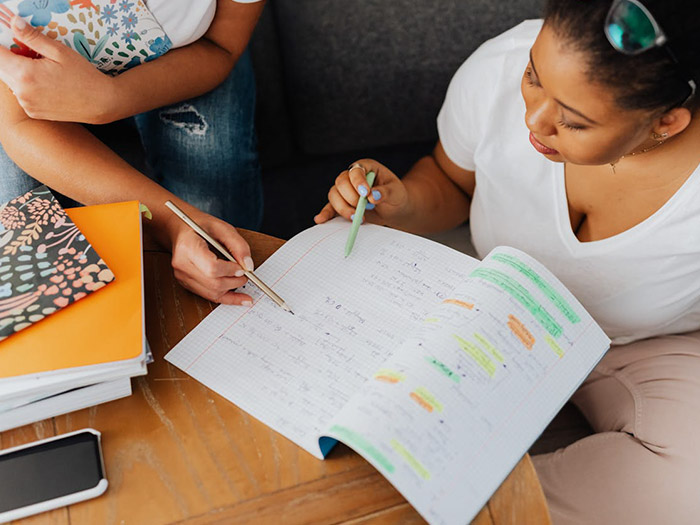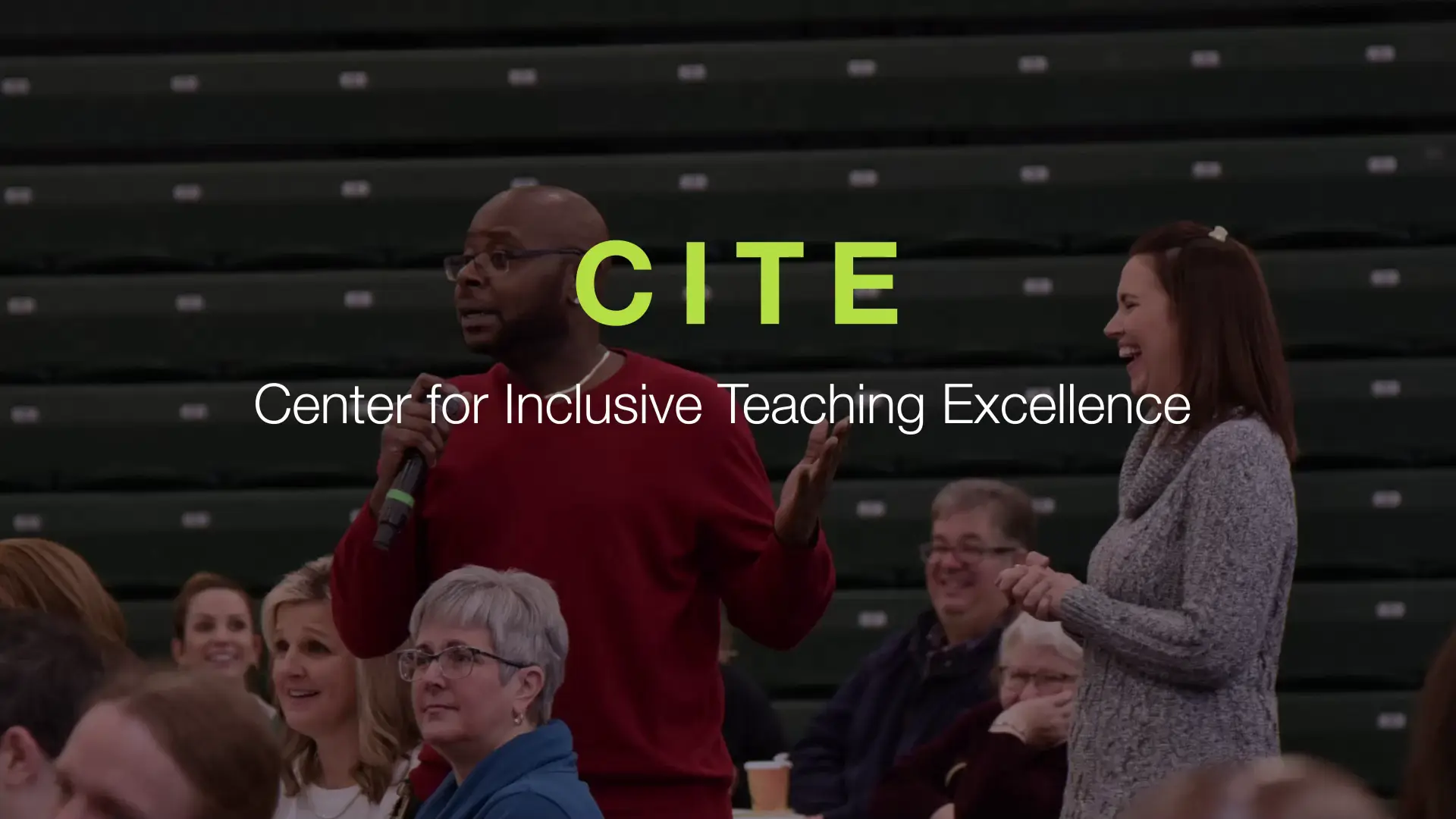Teaching Practice Bank
Increase your knowledge and strengthen student learning with our bank of research-supported teaching practices.
- Search the bank by using the category dropdown or enter a keyword.

Flipping the Classroom
Active Learning
Flipping the classroom is a teaching technique where instruction and course materials are introduced outside of class, and in-class time is used for assessment, inquiry, and applying knowledge.
Flipped, pedagogy, higher order thinking, activity

One minute paper
Active Learning; Assessment
Short writing activities during class is a powerful way to assess student learning.
periodic free recall, writing, activity, metacognition

Journaling
Active Learning; Assessment
Journaling as coursework is a less formal, more private than discussions, and reflective form of assessing learning through writing.
journaling, writing, activity

Embedding Executive Functions into Assignments
Assessment, Inclusive Classroom, Student Motivation
Although assignment descriptions may seem straightforward to instructors, ensuring clarity for students with executive functioning challenges (such as ADHD, autism, or learning disabilities) helps them complete tasks with greater confidence and less confusion.
assessment, student motivation, adhd, learning disabilities

Exit tickets
Active Learning, Assessment
Exit tickets are a quick means of surveying student comprehension and promoting the synthesis of class content.
formative assessment, exit ticket, metacognition, activity

Tech Tools for Interactive Slideshows
Active Learning, Assessment, Ed Tech
There are several software add-ons available to make lecture slideshows interactive to promote student engagement.
formative assessment, ed tech, interactive activity, quiz, polling

Grounding Practices to Reduce Anxiety
Well-Being, Inclusive Classroom
This resource includes three quick, research-supported practices that facilitate the shift from an anxious state to a relaxed and present one.
well-being, inclusive classroom

Just-In-Time Teaching
Assessment, Student Motivation
The instructor changes or improvises lectures or activities to adjust to student confusion revealed by students' responses to a quiz or poll.
metacognition, formative assessment

Project-Based Learning
Student motivation, Active Learning
The instructor guides students through a problem solving process to solve a real world problem. It's a teaching method that allows for more autonomy and student-directed learning.
teaching strategy, pedagogy, PBL, activity, real world experience, higher order thinking

Self-evaluation
Active Learning, Assessment
Self-evaluation is a good way to help students develop metacognitive skills. In order to learn from mistakes, but we must first recognize and correct the mistakes.
metacognition, evaluation, higher order thinking

Peer Teaching
Active Learning, Assessment, Student Motivation
Peer teaching is when students are responsible for a portion, or all, of a lesson.
activity, higher order thinking

Think-Pair-Share
Active Learning, Assessment, Student Motivation, Classroom Management
This technique gets the whole class involved, and is an effective way to overcome student reluctance to answer questions from the instructor.
interactive activity, teaching technique, pedagogy, formative assessment

Role Play
Active Learning, Student Motivation
Assign students roles in a true-to-life problematic situation. Students get conversational practice, problem-solving, empathy, and the opportunity to simulate real-world situations of the profession.
interactive activity, teaching technique, pedagogy, higher order thinking

Debate
Active Learning, Student Motivation, Classroom Management
Debate can be a learning activity to strenghen critical thinking, listening, public speaking, and leadership skills.
interactive activity, teaching technique, pedagogy, higher order thinking

Appointment making online calendar
Ed tech
Use an appointment making calendar tool, such as Microsoft Bookings or Calendly, to make it easy for students or colleagues to make an appointment with you.
Bookings, appointments, engagement

Kahoot
Active Learning, Student motivation, Ed tech, Assessment
Kahoot is a freemium game-based education platform. You can create easily create a quiz game to review learning objectives with the free version.
Kahoot, formative assessment, activity, review, quiz, fun

Exam Autopsy
Study Strategy, Assessment
This self-assessment activity gives students a window into what they know, helps improve test-taking and study skills, and enhances self-awareness
Metacognition, reflection, study tool, test anxiety

Peer Review Guidance
Classroom management; Active Learning; Assessment; Inclusive classroom
Help your students understand how to respond to peer written work.
Modeling, engagement, activity, higher order thinking, peer review, writing

Peer Review with PeerMark in Brightspace
Assessment
Turnitin's PeerMark in Brightspace provides students with the opportunity to give and receive feedback on each other’s writing after submitting a draft.
assessment, brightspace, peermark

Specifications grading
Assessment
Instead of using points to assess student work, the work is graded on a two-level rubric --- that is, some variation on Pass/Fail or Satisfactory/Unsatisfactory.
specs grading, assessment alternatives, feedback

Meditative or Mindful Reading
Active Learning, Community Building, Student Engagement, Well-being
Meditative or mindful reading is a subjective approach to reading that may compliment more objective approaches like the technical analysis of literature.
literature, reflection, analysis, assessment, higher order thinking

Review Roundup
Active learning, Student Engagement, Assessment
This activity gauges student's mastery of class content in an activity that they can do at their own pace. The activity not only lets the student recognize their learning gaps, but also gives the instructor information on what areas or topics students might be needing more materials or extra instruction.
metacognition, formative assessment

Case Study Group Review
Active Learning, Student Engagement, Student Motivation, Classroom Management
nan
nan

Engaging students in effective study strategies
Active learning, Study Strategy, Assessment
Modeling effective study strategies in the classroom promotes greater learning comprehention, retention, and metacognition. Teachers can help students use their memory more effectively with spaced retrieval practice, elaboration, and interleaving topics.
metacognition, science of learning, reflection, calibration, interleaving, spaced practice, exam preparation

Whiteboard Mini-Case Studies
Active learning, Assessment, Student Engagement
Mini-Case Studies are a more engaging way for students to practice and review material either independently or in small groups. Students/groups answer questions about "real world" scenarios using small sections of whiteboard and dry erase marker. By holding up the board when they are finished, answers can be quickly and easily assessed.
interactive activity, review, real world scenarios

Rock, Paper, Scissor Review Game
Active learning, Assessment, Student Engagement, Community Building
This game is a fun, interactive activity that can be used as a quick end-of-class review or as a class-long test preparation game.
interactive activity, review, formative assessment, gamification
Physical Location
Academic Building 249

